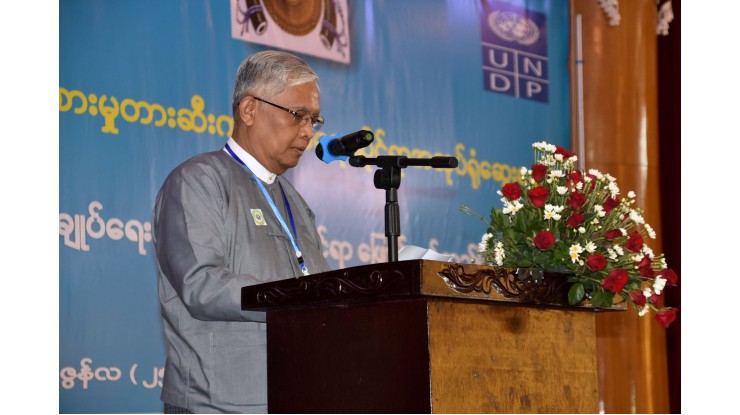“အုပ်ချုပ်ရေးနှင့် စီးပွားရေးဆိုင်ရာ ဖြောင့်မတ်တည်ကြည်မှု ” ခေါင်းစဉ်ဖြင့် အဂတိလိုက်စားမှု တားဆီးကာကွယ်ရေးဆိုင်ရာ အလုပ်ရုံဆွေးနွေးပွဲ ဘားအံမြို့၌ ကျင်းပခြင်း
- Tue, 25 June 2019

အဂတိလိုက်စားမှုတိုက်ဖျက်ရေးကော်မရှင်နှင့် ကရင်ပြည်နယ်အစိုးရအဖွဲ့တို့ပူးပေါင်း၍ ကုလသမဂ္ဂဖွံ့ဖြိုးမှုအစီအစဉ် (UNDP)၏ နည်းပညာအကူအညီဖြင့် “အုပ်ချုပ်ရေးနှင့် စီးပွားရေးဆိုင်ရာ ဖြောင့်မတ်တည်ကြည်မှု” ခေါင်းစဉ်ဖြင့် အဂတိလိုက်စားမှု တားဆီးကာကွယ်ရေးဆိုင်ရာ အလုပ်ရုံဆွေးနွေးပွဲကို ယနေ့နံနက်ပိုင်းတွင် ဘားအံမြို့၊ သီရိဘားအံ ဟိုတယ်၌ ကျင်းပသည်။
အလုပ်ရုံဆွေးနွေးပွဲတွင် ကရင်ပြည်နယ်ဝန်ကြီးချုပ် ဒေါ်နန်းခင်ထွေးမြင့်၊ အဂတိလိုက်စားမှုတိုက်ဖျက်ရေးကော်မရှင် ဥက္ကဋ္ဌ ဦးအောင်ကြည်တို့က အမှာစကားပြောကြားခဲ့ပါသည်။
ပြည်နယ်ဝန်ကြီးချုပ် ဒေါ်နန်းခင်ထွေးမြင့်က အမှာစကားပြောကြားရာတွင် အဂတိလိုက်စားမှုတိုက်ဖျက်ရေးကို တစ်ကမ္ဘာလုံးအတိုင်းအတာဖြင့် ဆောင်ရွက်နေခြင်းဖြစ်ပြီး အဂတိလိုက်စားမှုတိုက်ဖျက်ရေးကို အမျိုးသားရေးတာဝန် တစ်ရပ်အဖြစ် ဆောင်ရွက်ရာတွင် ပြည်နယ်မှ ပူးပေါင်းပါဝင်မည်ဖြစ်ပါကြောင်း၊ သန့်ရှင်းသောအစိုးရနှင့် ကောင်းမွန်သော အုပ်ချုပ်ရေးစနစ် တည်ဆောက်ရာတွင် သန့်ရှင်းသောအစိုးရဖြစ်ရန် ပိုမိုအရေးကြီးပါကြောင်း၊ အဂတိလိုက်စားမှုများကို ချက်ချင်းပပျောက်အောင် မဆောင်ရွက်နိုင်ဘဲ ထိန်းချုပ်၍ တဖြည်းဖြည်းလျော့နည်းအောင် လုပ်ဆောင်ရန်အတွက် လူတိုင်း၌ အဂတိလိုက်စားမှုတိုက်ဖျက်ရေးနှင့် ပတ်သက်သည့် အသိပညာရှိရန် လိုအပ်ပြီး အဂတိတရား (၄)ပါးလည်း ကင်းရန်လိုပါကြောင်း၊ နယ်မြေ/ဒေသအလိုက် မူးယစ်ကင်းစင်ရန်၊ အမှိုက်ကင်းစင်ရန်အပြင် အဂတိကင်းစင်ရန် လိုအပ်ပါကြောင်း၊ အဂတိကင်းစင်သောနယ်မြေငယ်မှ တဖြည်းဖြည်း ကျယ်ပြန့်လာအောင် ပူးပေါင်းဆောင်ရွက် ကြရမှာဖြစ်ကြောင်း၊ ပြည်သူတွေအသိတရားရရန် ယခုကဲ့သို့ အလုပ်ရုံဆွေးနွေးပွဲများကို မြို့နယ်အနှံ့ကျင်းပပေးရန် လိုအပ်ပါကြောင်း ပြောကြားခဲ့ပါသည်။
ဆက်လက်၍ ကော်မရှင်ဥက္ကဋ္ဌ ဦးအောင်ကြည်က အဖွင့်အမှာစကား ပြောကြားရာတွင် အဂတိလိုက်စားမှု သို့မဟုတ် အကျင့်ဖောက်ပြန်မှုသည် အစိုးရရုံးဌာနများ၊ စီးပွားရေးလုပ်ငန်းများအပါအဝင် လူ့အဖွဲ့အစည်းအသီးသီးတွင် ကျယ်ပြန့်စွာ လှိုက်စားဖျက်ဆီးနေသည့် တိတ်တိတ်ပုန်း အကျင့်ဆိုးတစ်ခုဖြစ်ပြီး တရားဥပဒေစိုးမိုးရေးနှင့် ဒီမိုကရေစီအုပ်ချုပ်ရေး အဆင့်ကို လျော့နည်းကျဆင်းစေ၍ လူ့အခွင့်အရေးဖောက်ဖျက်မှုများဆီသို့ ဦးတည်စေသည့်အပြင် အုပ်ချုပ်ရေးနှင့် စီးပွားရေးလုပ်ငန်းများတွင် အများယုံကြည်လက်ခံနိုင်စွမ်း ဆုံးရှုံးစေခြင်း၊ ပြည်သူ့ဘဏ္ဍာရန်ပုံငွေများကို လမ်းလွှဲသို့ ရောက်ရှိစေခြင်း၊ အထွေထွေကုန်ပစ္စည်းစျေးနှုန်းများ ကြီးမြင့်စေခြင်းနှင့် လူ့အဖွဲ့အစည်းများတွင် တန်းတူညီမျှမှုနှင့် သင့်တော်မျှတမှုပျောက်ဆုံးခြင်းတို့ကို ဖြစ်ပေါ်စေလျက်ရှိပါကြောင်း။အဂတိလိုက်စားမှုတိုက်ဖျက်ရေးသည် ကော်မရှင်တစ်ခုတည်း သို့မဟုတ် အစိုးရဌာနများ ဘက်ကချည်းသာ လုပ်ဆောင် ရသည့်အလုပ်မျိုးမဟုတ်ဘဲ ပုဂ္ဂလိကစီးပွားရေးလုပ်ငန်းများ၊ အရပ်ဘက်အဖွဲ့အစည်းများ၊ အစုအဖွဲ့အလိုက်နှင့် လူပုဂ္ဂိုလ် တစ်ဦးချင်းအလိုက်လည်း ပါဝင်ဆောင်ရွက်ကြရမည့် အလုပ်ဖြစ်ပါကြောင်း၊ အဂတိလိုက်စားမှု (သို့မဟုတ်) အကျင့်ဖောက်ပြန်မှုကိုတိုက်ဖျက်ရာတွင် လူတစ်ဦးချင်းစီကအကျင့်ဖောက်ပြန်မှုများ ဆက်လက်မလုပ်ဖြစ်စေရန်အတွက် မိမိကိုယ်ကိုမိမိ ဒီမိုကရေစီစိတ်ထား ထားတတ်အောင်၊ ကိုယ်ကျင့်တရားကောင်းအောင်၊ ဖြောင့်မတ်တည်ကြည်မှု ရှိလာအောင် ပြုပြင်ပြောင်းလဲစေခြင်းသည်သာလျှင် အဓိကလိုရင်းဖြစ်ပါကြောင်း၊ ဌာနဆိုင်ရာဝန်ထမ်းများသည်လည်း ပြည်သူလူထု၏ ယုံကြည်မှုကိုရယူ၍ ဝန်ဆောင်မှုပေးခြင်းအား စိတ်ကောင်းစေတနာဖြင့် ဆောင်ရွက်ရန် လုပ်ပိုင်ခွင့် အာဏာကို တာဝန်ခံမှုရှိစွာဖြင့်ဆောင်ရွက်ရန်နှင့် ဘက်လိုက်ခြင်းကင်းစွာဖြင့် ဆုံးဖြတ်ချက်ချ၍ ရိုးသားပွင့်လင်းစွာ အကောင်အထည်ဖော်ရန်ဖြစ်ကြောင်း၊ ပုဂ္ဂလိကစီးပွားရေးလုပ်ငန်းတိုင်းသည်လည်း အဂတိလိုက်စားမှုတိုက်ဖျက်ရေး ဆိုင်ရာ ကျင့်ဝတ်များကို မိမိဘာသာမိမိရေးဆွဲပြီး ကိုယ်တိုင်လိုက်နာကျင့်သုံးသွားရန်ဖြစ်ပြီး၊ ကော်မရှင်၏ အမိန့်ကြော်ငြာစာ ၁၄/၂၀၁၈ နှင့်အညီ အဆိုပါကျင့်ဝတ်၌ အဂတိလိုက်စားမှု ဖြစ်နိုင်ခြေအန္တရာယ်ရှိမှုကို ဆန်းစစ်အကဲဖြတ်ရမည်ဖြစ်ပြီး မိမိလုပ်ငန်းအတွက်သာမက ဆက်စပ်နေသော လုပ်ငန်းကွင်းဆက်အားလုံးအတွက်ပါ အကျုံးဝင်မှုရှိသော အဂတိလိုက်စားမှုတိုက်ဖျက်ရေး စီမံချက်လည်း ပါရှိရမှာဖြစ်ပါကြောင်း၊ အဂတိလိုက်စားမှု သို့မဟုတ် အကျင့်ဖောက်ပြန်မှုများသည် နယ်စပ်ဒေသများတွင် လူကုန်ကူးမှု၊ မူးယစ်ဆေးဝါး၊ တောရိုင်းတိရစ္ဆာန်ကုန်ကူးမှု၊ ငွေကြေးခဝါချမှု၊ တရားမဝင်ကုန်သွယ်မှုနှင့် အခြားနယ်စပ်ဖြတ်ကျော် အုပ်စုဖွဲ့ကျူးလွန်သော ပြစ်မှုအားလုံးလိုလိုနှင့် ဆက်စပ်ကာ ရှုပ်ထွေးသောကွင်းဆက်များ၏ အခြေခံပြဿနာဖြစ်ပြီး တစ်နိုင်ငံလုံးကို ထိခိုက်နစ်နာစေလျက်ရှိကြောင်း၊ သို့ဖြစ်ပါ၍ အစိုးရဌာနများ၊ စီးပွားရေးလုပ်ငန်းများ၊ အရပ်ဖက်အဖွဲ့အစည်းများနှင့် ပြည်သူလူထုကြီး တစ်ရပ်လုံးက အဂတိလိုက်စားမှုကို လုံးဝသည်းမခံ၊ ခွင့်မလွှတ်သော မူဝါဒချမှတ်လျက် ဖြောင့်မတ်တည်ကြည်မှုအစုအဖွဲ့(Integrity pact) အဖြစ်စုဖွဲ့ပြီး အဂတိလိုက်စားမှုကို စုပေါင်းအင်အားဖြင့်တစ်ပြိုင်နက် တိုက်ဖျက်သွားနိုင်ကြမည်ဆိုပါက အဆိုပါ ဒုစရိုက်ကွင်းဆက်အများအပြားကို သေချာပေါက်ဖြတ်တောက်ပစ်နိုင်မှာဖြစ်ပါကြောင်း ပြောကြားခဲ့ပါသည်။
ထို့နောက် အလုပ်ရုံဆွေးနွေးပွဲကိုဆက်လက်ကျင်းပရာ ကရင်ပြည်နယ် စီမံကိန်း၊ ဘဏ္ဍာရေးနှင့်စည်ပင်သာယာရေးဝန်ကြီး ဦးသန်းနိုင်က “ဖြောင့်မတ်တည်ကြည်မှုရှိသော အုပ်ချုပ်ရေးကဏ္ဍ”၊ ဒေါက်တာတင်မောင်သန်း(သင့်ဘဝ)က “ဖြောင့်မတ်တည်ကြည်မှုရှိသော အုပ်ချုပ်ရေးကဏ္ဍ”၊ ကုန်သည်/စက်မှုလုပ်ငန်းရှင်များအသင်းချုပ်မှ ကိုယ်စားလှယ် ဦးဝင်းမြင့်အောင် က “ဖြောင့်မတ်တည်ကြည်မှုရှိသော စီးပွားရေးကဏ္ဍ” ကော်မရှင်ရုံးမှ ညွှန်ကြားရေးမှူး ဒေါ်အေးမြတ်မွန်က “အများပြည်သူဝန်ဆောင်မှု၌ ဖြောင့်မတ်တည်ကြည်မှု” ၊ ဘားအံမြို့မှ ဒေသခံစီးပွားရေးလုပ်ငန်းရှင် ကိုယ််စားလှယ် ဦးစောဟန်အေး က “ဖြောင့်မတ်တည်ကြည်မှုရှိသော စီးပွားရေးလုပ်ငန်းများ”၊ ဘားအံမြို့မှ ဒေသခံ CSO ကိုယ်စားလှယ် ဦးစောကျော်ဇွာ က “ဖြောင့်မတ်တည်ကြည်မှုရှိသော CSO ကဏ္ဍ” ၊ UNDP ကိုယ်စားလှယ် ဦးအောင်ထွန်းက “အဂတိလိုက်စားမှုအန္တရာယ် ဖြစ်နိုင်ခြေရှိမှု” ခေါင်းစဉ်များဖြင့် ဆွေးနွေးကြပါသည်။
မွန်းလွဲပိုင်းတွင် တက်ရောက်ကြသူများက သိရှိလိုသည်များကို မေးမြန်းကြရာ တာဝန်ရှိသူများက ပြန်လည်ဖြေကြားခဲ့ပြီး အခမ်းအနားအား ၁၃:၃၀ နာရီအချိန်တွင် ပိတ်သိမ်းခဲ့ပါသည်။
ဆွေးနွေးပွဲသို့ ကရင်ပြည်နယ်အစိုးရအဖွဲ့ ပြည်နယ်ဝန်ကြီးချုပ်နှင့် အစိုးရအဖွဲ့ဝင် ဝန်ကြီးများ၊ ကော်မရှင်ဥက္ကဋ္ဌနှင့် အဖွဲ့ဝင်၊ ပြည်နယ်လွှတ်တော် ဥက္ကဋ္ဌနှင့် ဒုတိယဥက္ကဋ္ဌ ပြည်နယ်တရားသူကြီးချုပ်၊ ပြည်နယ်ဥပဒေချုပ်နှင့် ပြည်နယ်စာရင်းစစ်ချုပ်၊ ပြည်နယ်တရားလွှတ်တော်တရားသူကြီးများ၊ လွှတ်တော်ကိုယ်စားလှယ်များ၊ ပြည်နယ်/ ခရိုင်/မြို့နယ်အဆင့် ဌာနဆိုင်ရာအကြီးအကဲများ၊ မြို့မိမြို့ဖများ၊ ကုလသမဂ္ဂဖွံ့ဖြိုးမှုအစီအစဉ် UNDP မှ တာဝန်ရှိသူများ၊ လူမှုရေးအဖွဲ့အစည်းများမှ ကိုယ်စားလှယ်များ၊ စီးပွားရေးအဖွဲ့အစည်းများမှ ကိုယ်စားလှယ်များ၊ သတင်းမီဒီယာများမှ ကိုယ်စားလှယ်များနှင့် ဖိတ်ကြားထားသော ဧည့်သည်တော်များ စုစုပေါင်းအင်အား(၅၀၀) ကျော်ခန့် တက်ရောက် ကြပါသည်။


/3-80x80.JPG)
/01-80x80.jpg)

/1-80x80.jpg)





